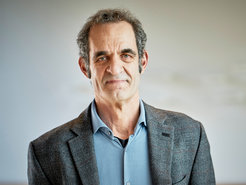Jonathan Gershenzon new member of the Leopoldina
The biochemist and director at the Max Planck Institute for Chemical Ecology in Jena has been elected member of the German National Academy of Sciences.
Max Planck director Jonathan Gershenzon from Jena has been elected as a new member of the Organismic and Evolutionary Biology Section of the Leopoldina. Acceptance to the oldest natural science society in the German-speaking world is considered one of the highest scientific honors in Germany. The American is a leading expert in the field of plant biochemistry: He investigates the biosynthesis and ecological functions of plant metabolites.

As the German National Academy of Sciences, it is a major task of the Leopoldina to communicate on current issues from an independent scientific perspective, in order to advise government agencies and representatives. To this end, it regularly publishes statements, such as in recent years on national climate policy or on the coronavirus pandemic. Outstanding scientific experts from all over the world are admitted to the Leopoldina on the recommendation of members and after a multi-stage selection process. They contribute their expertise to thematic groups, which include biodiversity, genetic engineering and climate.
Jonathan Gershenzon is known worldwide for his research on the chemical ecology of plant defenses. He has contributed to the elucidation of the biosynthetic pathways of important plant defense compounds, particularly among the terpenes and mustard oil glycosides. These plant metabolites play a crucial ecological role in the resistance of plants to pest attack. He has investigated, for example, the defense strategies of spruce and poplar, but also of maize, cassava, rape and cabbage plants.
He is happy about the honor and is now looking forward to his new advisory role at the Leopoldina. Among the issues that are of particular interest to him in this context, are facilitating green gene technology, preserving the Earth's biodiversity and mitigating global warming. "A strong motivation for getting involved in Leopoldina’s advisory role is to learn more about how scientists can provide effective advice to government agencies, especially in times of crisis," he says. "Having received generous support from the German government for my research at the Max Planck Society over many years, I also look forward to giving something back to the German public. “
The formal induction of the new members will take place in May 2022.












